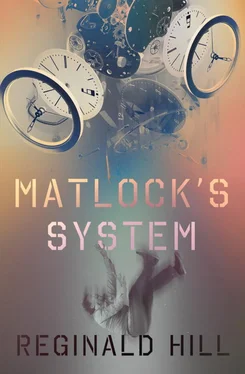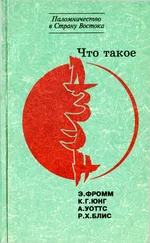“Well now,” said the Inspector, “I see that you are, or at least ought to be, fully awake.”
Matlock didn’t move. The Inspector did, and a split second of fearful pain coursed round his body.
“There you are. Try not to drop off again. Right, Sergeant. I think we can begin.”
The Sergeant produced a small radio-microphone which he attached to the wall apparently magnetically. He switched it on.
The Inspector spoke.
“Zero one-thirty hours. Thursday 13th September. Interrogation of Matthew Matlock by 0576621 Inspector Ross P.K.”
The Sergeant spoke.
“Witnessed and recorded by 3789552 Sergeant Hamer P.”
“Now Mr. Matlock,” said the Inspector. “Let me sketch out to you briefly the information I wish to obtain from you before we reach Headquarters. Firstly, with regard to your escape tonight from Fountains Abbey, it seems unlikely that you could have done this unassisted. I want to know first of all which members of the attacking force aided you. Secondly, I want to know where you were going when we picked you up.”
Matlock opened his mouth, but the Inspector raised his hand.
“No, don’t speak yet. We’ll take your first answer as spoken. People always lie the first time. Let’s just say we don’t believe you.”
He moved his hand.
The pain this time lasted several seconds and left Matlock feeling as though his nerve-ends had been rubbed raw.
“Now I’ll ask you again. Who helped you to escape? Where were you going?”
Matlock opened his mouth again, but before he could speak, the pain returned, longer lasting, more violent, and the words turned into a high, drawn-out shriek.
“That was just in case you were thinking of lying again. Now the truth, please.”
“No one. Nowhere,” rasped Matlock from a dry, rough throat.
“Really? That is helpful. You should perhaps realize Mr. Matlock that I can take you to the edge of unconsciousness and keep you there for some minutes without actually pushing you over. That’s the beauty of these things.”
He caressed the control panel affectionately.
“Why not truth drugs?” muttered Matlock.
“Those will come, never fear. But in laboratory conditions. For all I know, you are pumped full of one of the many neutralizing drugs which have been developed. For rapid accurate results, nothing can beat this. Now I don’t like your answer, I’m afraid.”
Again pain, taking him to the brink of a deep dark pit into which he tried desperately to fall, but always he was pulled back, always he swayed on the edge.
“No one. Nowhere. Truth,” he muttered again.
Then he was back by the pit, screaming to be plunged into the oblivion which swirled vaporously below.
His mind now wanted to say something, anything, which would satisfy the Inspector, but he could think of nothing, he was incapable of imagining, of inventing. Some very remote, still controlled part of his mind noted the effectiveness of the torture, but it was light-years away. Then like a headlight in the fog it came slowly, imperceptibly closer and closer till suddenly it rushed on him with unstoppable impetuosity and he opened his eyes to a world beautifully free from pain, but still hideous with its memory and its threat.
The respite had been caused by an interruption. Clambering down through the trap was a constable. In his hand was a message form.
He saluted.
“Radio from H.Q. Sir.”
“Read it,” said the Inspector.
“It’s coded, Sir.”
The Inspector motioned to the Sergeant who took the paper. The constable saluted again and climbed out.
The Sergeant stood hesitating for a moment.
“Do you want me to ...” he began.
“You’re studying for your promotion exams, aren’t you?” said the Inspector with the slightest hint of a sneer.
Without replying or saluting the Sergeant left.
The Inspector spoke into the mike.
“Interrogation pause. Zero One-Forty-Seven Hours.” He switched off and said conversationally to Matlock.
“We’ve got to have a witness.”
Seventeen minutes, thought Matlock. At this rate the few days that remain to me can seem longer than the previous seventy years.
The Inspector was quietly smoking a cigarette and making a note of some figures on the control panel.
“You’re a pretty fit fellow, Mr. Matlock. I can understand how you feel about the Age Limit. But you couldn’t really hope to do anything about it, could you, now?”
He sounded almost reproachful.
The trapdoor opened and the Sergeant’s well-set figure filled the square. He came slowly down and stood at attention. Matlock even through his weakness felt he detected a kind of triumph in the way the man stood, though his face was the old subordinate blank.
“Message decoded, sir,” he intoned expressionlessly.
“Not bad, Sergeant,” smiled the Inspector. “Read it please.”
The Sergeant held the paper up before him, but Matlock got the impression he did not need it. His eyes seemed to be focused on the Inspector.
“From Commissioner One,” he began. The Inspector became absolutely still. This was not the message-source he had expected, Matlock guessed. Commissioner One was the man responsible directly to the Prime Minister for the police force of the country.
The Sergeant went on in the monotonous voice usually reserved for the giving of evidence in court.
“Your message acknowledged. Bring prisoner quickest repeat quickest to local H.Q. Do not stop for any reason whatever repeat do not stop for any reason whatever. Pick up no one repeat pick up no one. Do not commence interrogation of prisoner. Ensure that all further messages concerning prisoner are encoded repeat encoded. Message ends.”
There was a silence.
“Sergeant,” said the Inspector softly, “didn’t the operator encode my first message.”
“No, sir.”
“Despite my instructions?”
This was an invitation, Matlock decided, an invitation to cover up. But he saw the Sergeant was in no mood to conspire.
“You gave no instructions, sir. I checked. There were three constables present. Shall I file the interrogation tape, sir?”
The Inspector pulled himself together and managed an ironic smile.
“Yes, you better had, Sergeant. At the same time ensure the time of receipt of this message is clearly recorded, send off an acknowledgement, and pass the instructions about not stopping or arresting to the control room. No, on second thoughts I can do that more quickly from here. You might be delayed.”
There was an unmistakable stress on the ‘you’, but the Sergeant showed no reaction and busied himself removing the radio-microphone, while the Inspector moved over to the telephone.
Matlock’s relief at realising he was temporarily free from the threat of further torture brought him new strength. His mind began to regain its old agility and he had watched the Inspector closely, realizing that despite his effort at unconcern here was a sadly worried man. More interesting to Matlock than the Inspector’s personal worries, however, was the background to the message.
Obviously the news of his arrest had been channelled right up to the top, to Browning himself most likely. Hence the reply from Commissioner One. He felt mildly flattered, but more interesting still was Browning’s desire to save interrogation till he personally could deal with it. Matlock smiled. There were things about the setting up of the Abbey which the Prime Minister would not want blurted out by a tortured and obviously truth-telling man.
But most interesting of all was the reprimand for not encoding the message about his capture. The implication was that they were worried about possible interception of messages. But by whom? And to what effect? Rescue must be out of the question. Even if there was anybody desirous of rescuing him and capable of arranging action in the twenty minutes or so since the message was sent, he was now imprisoned in the strongest most impregnable vehicle ever known to man, on his way to what he suspected was going to be even closer confinement.
Читать дальше












